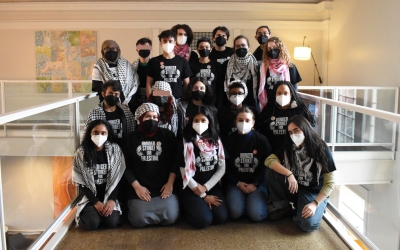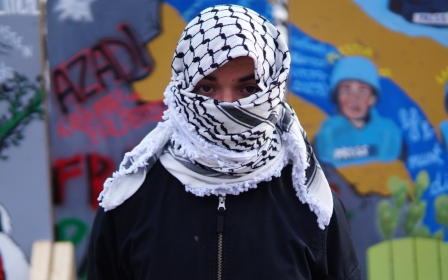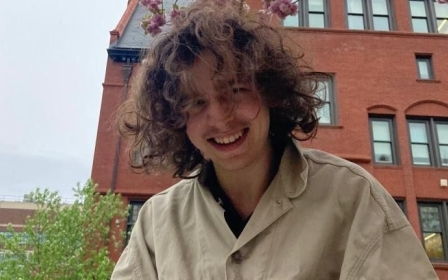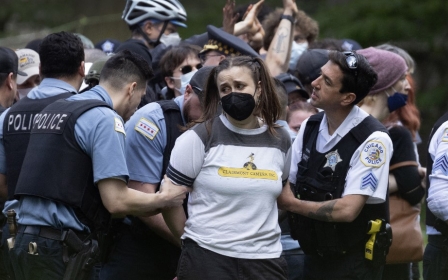Pro-Israel camp ramps up pressure ahead of historic Brown University divestment vote
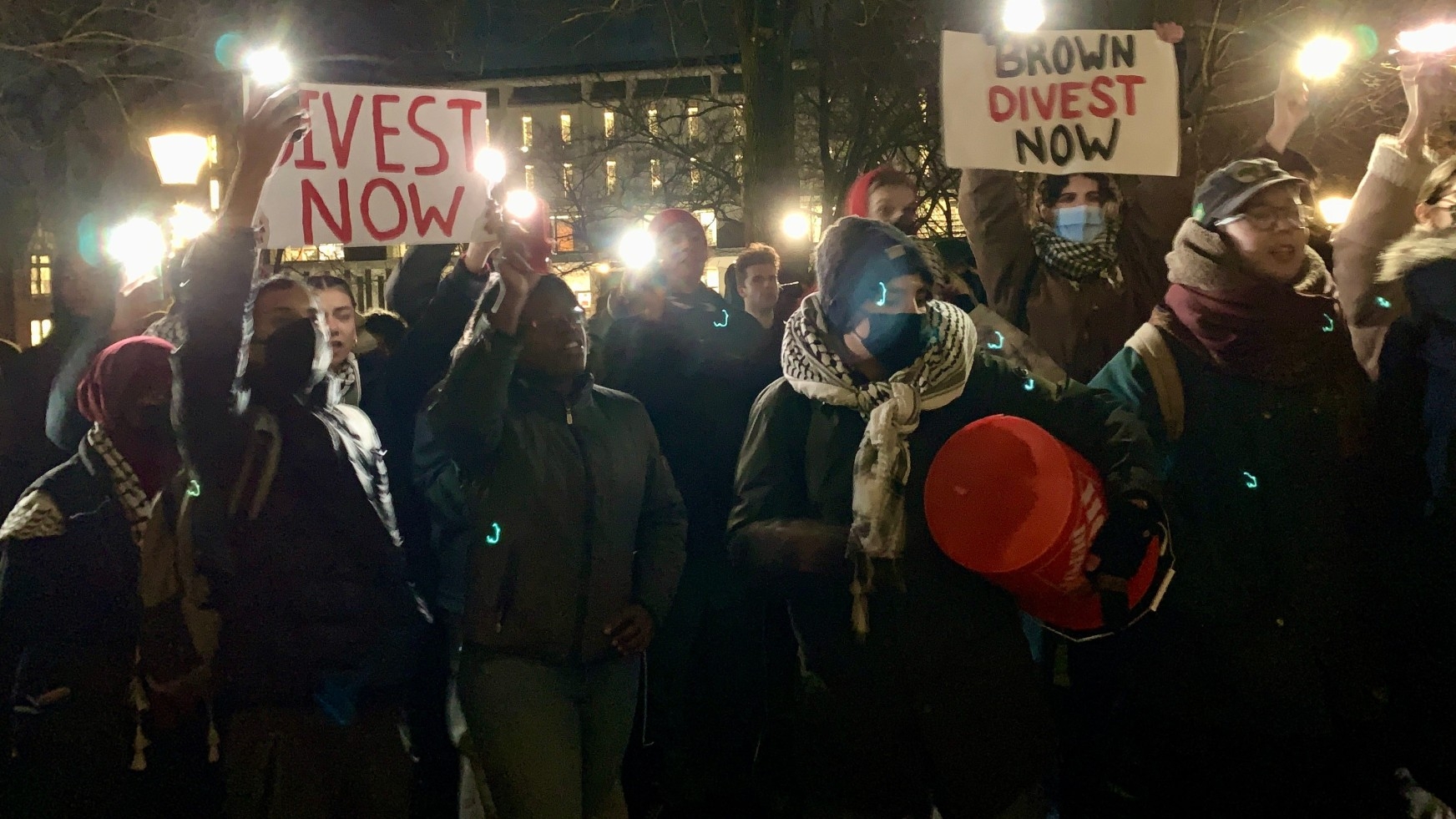
When the student encampment in support of Gaza was dismantled at Brown University in Rhode Island back in April, it was incumbent upon one request from protesters: that the university hold a vote to divest from companies engaged in Israel’s human rights violations against Palestinians.
That rare vote is scheduled to take place next month, and with the anniversary of the 7 October attacks approaching, pro-Israel voices on campus are now stepping up pressure on the Corporation of Brown University - its board and leadership - to avoid the vote entirely.
In February this year, a coalition of students at Brown embarked on a hunger strike demanding that the university divest from companies profiting from the ongoing genocide in Gaza.
On Monday, a group of students made up of members of Brown Students for Israel, among others, are making the case in front of the Advisory Committee on University Resources Management (ACURM) that a vote on divestment is “functionally antisemitic” and that “there is no genocide in Gaza”, according to a memo that has not yet been released to the public.
Middle East Eye has examined the 39-page document drawn up by the students, entitled ‘The Case Against Divestment’. It insists that “investment in military equipment producers keeps Israelis… safe.”
New MEE newsletter: Jerusalem Dispatch
Sign up to get the latest insights and analysis on Israel-Palestine, alongside Turkey Unpacked and other MEE newsletters
“It is clear that the [Israeli military] is conducting an ethical war – while Hamas has systematically violated international law by firing missiles from hospitals, storing weapons caches in classrooms, and holding hostages there,” the document states.
Nearly 41,000 Palestinians have been killed in Gaza as a result of Israeli air strikes, sniper fire and the lack of food and medicine, according to the latest figures from the Palestinian health ministry. The United Nations says Israel has committed “acts of genocide” in Gaza.
Brown Divest Coalition (BDC) is seeking to have the university divest its $6.6bn endowment away from 10 companies in particular that have contributed resources and technology to Israel’s war on Gaza, as well as its decades-long occupation: AB Volvo, Airbus, Boeing, General Dynamics, General Electric, Motorola, Textron, Raytheon, Northrup Grumman and the Safariland Group.
“We're following a very long divestment campaign that’s over a decade old,” Arman Deendar, a senior at Brown University and organiser with Students for Justice in Palestine (SJP), told Middle East Eye.
“Students at Brown… are incredibly committed to social justice, incredibly committed to ideas of liberation and collective liberation for all. I want to credit that work.”
The fallout from Israel's war on Gaza became more tangible at Brown when student Hisham Awartani was shot and paralysed from the chest down in November last year. Artwani was walking near his grandmother's home on 25 November, alongside Kinnan Abdel Hamid, a student at Haverford College, and Tahseen Ahmed of Trinity College. The students, all aged 20, are graduates of the Ramallah Friends School in the occupied West Bank.
The three of them were speaking Arabic and wearing keffiyehs, a scarf synonymous with Palestinian solidarity, on their way to dinner when they were shot by a gunman in Burlington.
A prominent victory
The fact that the vote is happening at all may very well indicate a shift in priorities at some Ivy League institutions like Brown that style themselves on progressive values.
Joseph Edelman, now a former member of the board of trustees at Brown who resigned over the decision to move for a vote, said the move is “morally reprehensible”.
In portions of his resignation letter published Sunday in the Wall Street Journal, Edelman described the upcoming vote as “capitulation to the very hatred that led to the Holocaust and the unspeakable horrors of Oct 7”.
“It’s as if the Brown board has agreed to vote on whether Israel has a right to defend itself, whether Israel has a right to exist, and even whether Jews have a right to exist,” he wrote.
Both Edelman and the anti-divestment student group said that investment in companies tied to Israel does not result in “social harm” when geopolitical realities mean Israel must defend itself.
“Edelman brings up this point, which seems incredibly detached from the material reality of what’s happening in Gaza, what’s happening in Palestine, and we affirm that genocide, apartheid, scholasticide are valuable instances of social harm, and that is what the university should be considering,” Deendar said.
“I would ask, Why? Why would he resign instead of sticking it out and voting no? Is there a larger picture that we, the public, don’t know?”
Brown’s experience differs from several major academic institutions across the US that have refused to entertain the prospect of divestment from Israel-linked companies, including the University of California system and the University of Michigan. They argue their endowments cannot be subject to political pressure.
Student encampments against Israeli occupation and the war on Gaza emerged on campuses across the country from March through May, dominating headlines in a move never before seen on such a scale. Most were dismantled by force, at times in violent raids by police.
The Brown University resolution was viewed as a unique success.
“We all recognise that even after this vote, regardless of if it’s a yes or no, the divestment movement and the movement for free Palestine will not end on this campus,” Deendar said. “Divestment [is] a tactic, and we know that it’s just one step in a long process.”
MEE has reached out to Brown students who signed an open letter in support of Israel late last year but did not hear back by time of publication.
The next meeting of the Corporation of Brown University is set to take place on Oct 17-18, when the divestment vote is expected to take place.
Middle East Eye delivers independent and unrivalled coverage and analysis of the Middle East, North Africa and beyond. To learn more about republishing this content and the associated fees, please fill out this form. More about MEE can be found here.


